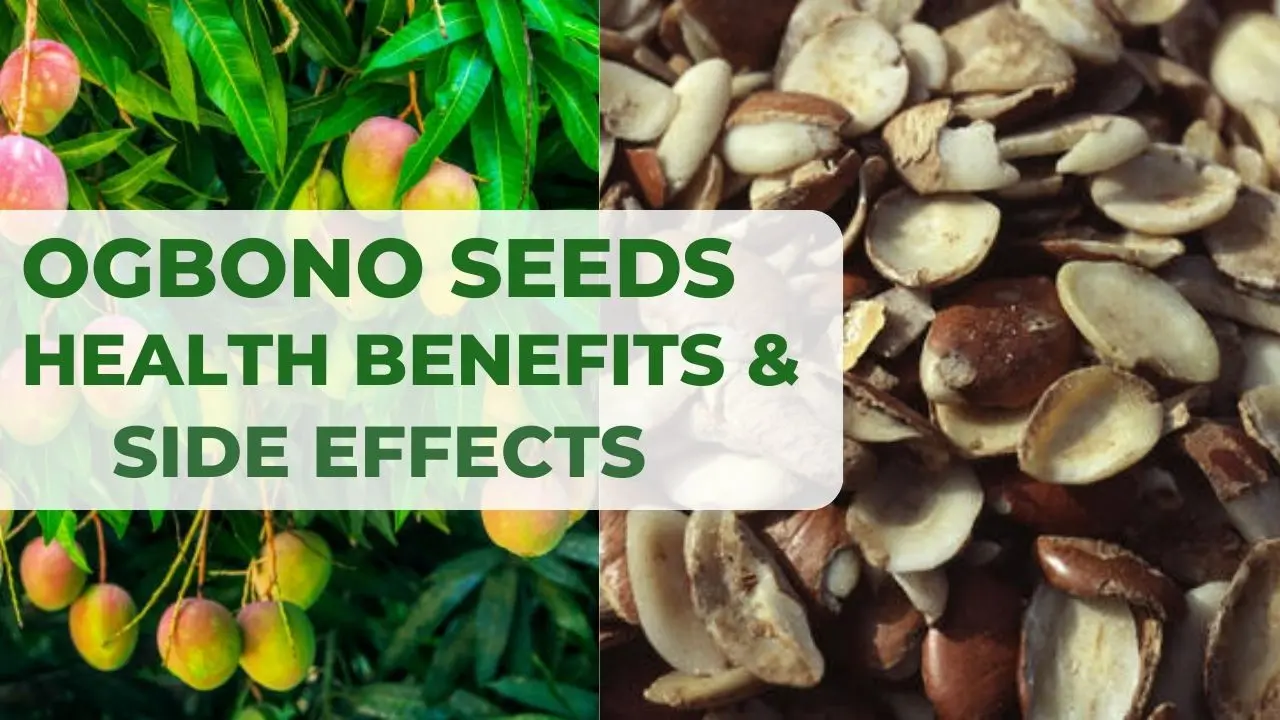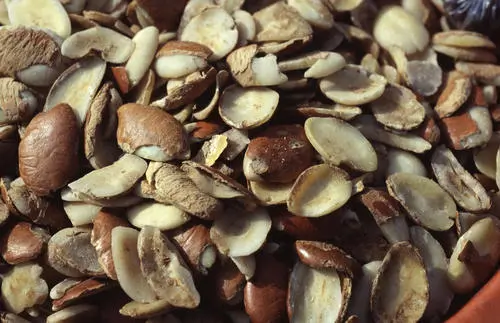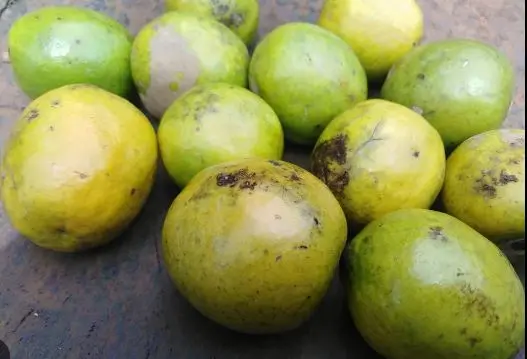The Ogbono seed, also referred to as bush mango seed, is not only an exotic ingredient but also a nutritional powerhouse that can have a transformative impact on your health. Although the bush mango fruit is sweet and juicy, the seed is bitter and is typically dried and ground before use. Apart from being a key ingredient in West and Central African cuisine, Ogbono seed is loaded with nutrients, antioxidants, fibre, and healthy fats.
In this article, we will take a closer look at the health benefits and side effects of Ogbono seed. You will discover how this seed can enhance your cholesterol levels, blood pressure, blood sugar, digestion, fertility, and more. You’ll also learn about issues related to the bush mango seed.
Get ready to explore the benefits and effects of Ogbono seed and learn how it can improve your health!
History and Origin of Bush Mango Seeds (Ogbono Seeds)
The Bush Mango tree, known scientifically as Irvingia gabonensis, is native to the rainforests of West and Central Africa. Also called the African Mango, wild mango, or dika nut tree, indigenous populations have used this valuable plant for centuries. The sweet bush mango fruit has a large fruit, just like the common mango, and inside this fruit is the Seed. Ogbono has been consumed and used culturally across Nigeria, Cameroon, Gabon, Congo, Southern Sudan, and Angola for generations.
Traditional healers in these parts of Africa have long valued the medicinal properties of Bush Mango Seeds, using them to treat different kinds of ailments. The use of Ogbono for soups also has a long cultural history in West African cuisine.
So, while Bush Mango seeds may not be globally known, they have a rich legacy in Africa as both a nutritional food source and a traditional medicine.
Nutritional Facts of Ogbono Seed
The Bush Mango Seed (Ogbono) is very nutritious and high in vitamins and nutrients. In just 100 grams of Ogbono, which is about 3.5 ounces, you’ll find 1 gram of protein, 0.4 grams of fat, and 18 grams of carbohydrates.
This portion also provides 62% of the Daily Value for vitamin C. So, the African mango contains protein, healthy fats, carbs, and high levels of immune-boosting vitamin C in a low-calorie package of only 86 calories per 100 grams.
In all, the Bush Mango Seed (Ogbono) contains a high dose of important vitamins, minerals, fibres and antioxidants that make it very nutritious.
Uses of Ogbono Seed
Bush mango seeds, also known as Ogbono seeds, is a very important seed in Africa, especially in Nigerian foods, medicine, and cosmetics, for hundreds of years. These seeds have various uses, some of which are:
- Cooking: The seeds are ground into a powder that is used to prepare Ogbono Soup, a popular dish in Africa. This savoury soup is made with meat, fish, vegetables, and spices and is usually eaten with fufu or pounded yam.
- Medicine: Bush Mango seeds have been traditionally used to treat a range of ailments such as diabetes, obesity, high cholesterol, high blood pressure, malaria, fever, diarrhoea, constipation, stomachache, ulcers, wounds, infections, inflammation, pain, arthritis, asthma, cough, anaemia, infertility, impotence, menstrual problems, and more. Modern research has confirmed the medicinal properties of Bush Mango Seeds and their extracts.
- Cosmetics: Bush Mango seeds are also used for cosmetic purposes. The oil extracted from the seeds is applied to the skin to prevent dryness, wrinkles, sunburns, infections, and inflammation. The oil is also massaged into the scalp and hair to prevent dandruff, hair loss, and breakage.
Health Benefits of Ogbono Seed
As we have seen, ogbono seeds are not only delicious but also nutritious and beneficial for various health conditions. Here are some of the specific benefits of ogbono seeds for different aspects of health:
Ogbono Seed for Weight Loss
One of the most popular benefits of Ogbono seed is its ability to help with weight loss and obesity. This is because Bush Mango Seeds contain a high amount of soluble dietary fibre that forms a gel-like substance in the stomach and intestines. This gel slows down the digestion and absorption of carbohydrates and fats, reduces appetite and hunger hormones, increases satiety and fullness hormones, and lowers calorie intake and energy expenditure.
Several clinical studies have shown that taking Ogbono extract can significantly reduce body weight, body fat percentage, body mass index (BMI), waist circumference, hip circumference, and waist-to-hip ratio in overweight and obese people.
Ogbono seed can also improve other metabolic parameters such as blood sugar levels, insulin sensitivity, cholesterol levels, triglyceride levels, and leptin levels in obese people.
Ogbono Seed for Cholesterol
Another benefit of Bush Mango Seed is its ability to lower cholesterol levels and improve heart health. This is because Ogbono seed contains a high amount of monounsaturated fatty acids (MUFAs) that can reduce the bad low-density lipoprotein (LDL) cholesterol and increase the good high-density lipoprotein (HDL) cholesterol in the blood. MUFAs can also prevent the oxidation of LDL cholesterol, which can cause plaque formation and artery blockage.
The seed also contains beta-sitosterol, a plant sterol that can inhibit the absorption of cholesterol from the diet and lower cholesterol and LDL cholesterol levels in the blood. Beta-sitosterol can also modulate the immune system and reduce inflammation, which can damage the blood vessels and cause cardiovascular diseases.
Ogbono Seed for Hypertension
Ogbono helps to regulate blood pressure and prevent hypertension. This is because Bush Mango seed contains potassium. This mineral can balance the sodium levels in the body and relax the blood vessels. Potassium can also regulate the heart rate and rhythm and prevent arrhythmias that can cause cardiac arrest.
Ogbono seed also contains flavonoids, antioxidants that can protect the endothelial cells that line the blood vessels from oxidative stress and enhance the production of nitric oxide. This molecule can dilate the blood vessels and lower blood pressure.
Ogbono Seed for Diabetes
Bush Mango Seeds have the ability to control blood sugar levels and prevent diabetes. This is because Ogbono seed contains soluble dietary fibre that can slow down the digestion and absorption of carbohydrates and prevent spikes and crashes in blood sugar levels. Fibre can also improve insulin sensitivity and glucose uptake by the cells and lower the insulin resistance and glucose intolerance that can cause type 2 diabetes.
Ogbono also contains ellagic acid, a polyphenol that can inhibit the activity of alpha-amylase and alpha-glucosidase. These two enzymes break down starch and sugar into glucose. By blocking these enzymes, ellagic acid can reduce postprandial (after-meal) blood glucose levels and prevent hyperglycemia (high blood sugar).
Ogbono Seed for Fertility
Ogbono helps with fertility issues and reproductive health. This is because Bush Mango seeds contain beta-sitosterol. This plant sterol can increase hormonal balance and improve the function of the reproductive organs. Beta-sitosterol can increase the production of testosterone, estrogen, progesterone, and luteinizing hormone (LH) and decrease the production of prolactin and follicle-stimulating hormone (FSH) in both men and women. These hormones are essential for sperm production, ovulation, implantation, pregnancy, and lactation.
Ogbono seed also contains lupeol, a triterpene that can protect the sperm from oxidative stress and DNA damage and improve sperm quality, motility, viability, and count. Lupeol can also prevent sperm agglutination (clumping) and enhance sperm capacitation (the ability to fertilize an egg).
Ogbono Seed for Diarrhoea
The Bush Mango Seeds help to stop diarrhea and restore electrolyte balance. This is because the seed contains soluble dietary fiber that can absorb water and electrolytes from the intestinal lumen and form a viscous gel that can slow down intestinal transit and reduce stool volume and frequency. FFibrecan also binds to toxins and pathogens that can cause diarrhoea and eliminates them from the body.
Ogbono seed also contains alkaloids, nitrogen-containing compounds that can inhibit the activity of intestinal motility receptors and reduce the intestinal contractions and spasms that can cause diarrhea. Alkaloids can also have an antidiarrheal effect by modulating the secretion of chloride ions and water into the intestinal lumen.
Side Effects of Ogbono Seeds
While Bush Mango Seeds offer many health benefits, there are some potential side effects and precautions to keep in mind:
- Allergic Reactions: Some individuals may experience allergic reactions to Ogbono, including symptoms like rashes, hives, swelling, breathing difficulties, or anaphylaxis. If you’re allergic to nuts or seeds, take caution when using Ogbono; it’s advisable to use only a small portion to see how your body reacts to it.
- Drug Interactions: Ogbono seed can potentially interact with medications for diabetes, blood pressure, blood clotting, and cholesterol. It may enhance their effects and lead to complications like low blood sugar, pressure, or lipids.
- Pregnancy Safety: There is insufficient evidence on the safety of Ogbono for pregnant or breastfeeding women. Some studies suggest it may improve fertility, while others indicate possible risks like congenital disabilities or miscarriage. Pregnant and nursing mothers should use or eat Ogbono moderately and ensure to see a doctor if they notice any changes or issues after using or taking Ogbono.
Note: If you experience any issues or symptoms after consuming or using Ogbono, you should stop using it and seek medical attention immediately.
Frequently Asked Questions:
What Is Ogbono Called in English?
Ogbono is called “Bush Mango” in English.
How Does Bush Mango Look Like?
Bush mango is a small tree with bright green leaves and small yellow flowers. The tree bears a fleshy, oval-shaped fruit that resembles a mango. When ripe, the fruit turns yellow or orange in colour. Inside the fruit or shell is a seed that is called an Ogbono seed.
What Is the Yoruba & Igbo Name for Bush Mango?
In the Yoruba language, bush mango is called ‘Apon.’ In Igbo, it is referred to as ‘Ugbono’.
What Are the Different Types of Bush Mangoes?
There are two main varieties of wild mangoes – the sweet wild mango and the bitter-skinned wild mango. The scientific name for the sweet wild mango is Irvingia gabonensis, and it has a pleasing sweet taste. The bitter-skinned wild mango, on the other hand, has the scientific classification of Irvingia Wombolu and a very unpleasant bitter taste.
How Can I Store Ogbono Seed?
You can store Ogbono seed by keeping it in an airtight container in a cool and dry place away from sunlight and moisture.
Conclusion
In conclusion, bush mango seed or Ogbono seed is a nutritious and beneficial seed that can be used for cooking, medicine, and cosmetics. It has various health benefits such as weight loss, cholesterol-lowering, blood pressure regulation, blood sugar control, fertility enhancement, skin nourishment, hair strengthening, constipation relief, stomach ache soothing, and diarrhea stopping.
However, it also has some side effects and precautions, such as allergy, drug interactions, pregnancy and breastfeeding risks, and overdose risks.
Therefore, you should consume Ogbono seed in moderation and with caution or consult your doctor before using it.






